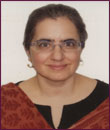Dr. Sunita Vatuk
| Grant Category: | Fulbright-Nehru Senior Researcher |
| Field of Specialization: | Anthropology |
| Name: | Dr. Sunita Vatuk |
| Official Address: | Centre for Mathematics, Science and Computer Education Rutgers – The States University of New Jersey, Piscataway, New Jersey |
| Indian Host Institution: | The Institute of Mathematical Sciences
Chennai, Tamil Nadu |
| Duration of Grant & Start Date : | Duration: 9 months March 2012 |
| Brief Bio: | |
| Dr. Sunita Vatuk is a mathematician who studies geometric properties of differential equations. She has also conducted research on math education, and has supported math teachers in high poverty schools, conducting professional development in math as well as in using the visual arts and museum resources. She holds a Ph.D. from Princeton University in geometric classification and darboux integrability of hyperbolic systems of differential equations. She was the 2009-2010 Ulam Professor of Mathematics at the University of Colorado, Boulder, conducting research on the classification of affine distributions, again using geometric methods, and running a seminar on math education for graduate students in mathematics. Dr. Vatuk was a Research Associate at the Graduate Center of CUNY doing research and professional development on and with math teachers in the New York City schools from 2006-2009. She is currently a Research Associate at Rutgers University, Piscataway, studying the interactions between mathematicians, math educators and teachers enrolled in an NSF-funded masters program for in-service middle school teachers. Her interests in math education center around the content knowledge needed for effective teaching, and the role mathematicians can or should play in supporting teachers. As a serious amateur ceramicist, and inspired by the resemblance between the best math classes and visual arts classes, she was inspired to develop workshops for math teachers (in collaboration with the teacher education program at the Museum of Modern Art as well as through CUNY) and curricula for high school and middle school students that use looking at and making visual art (in collaboration with Dream Yard, among others). In Tamil Nadu, many women make threshold designs (kolams) each morning. Many have interesting mathematical properties. Some mathematicians have used the designs to inspire mathematical research. Others, including this researcher, have created activities at the college level and for K-12 teachers using kolams in the math classroom. Despite the obvious (to a mathematician) connections to mathematics, it does not appear to be common for the makers of these designs to view them in that light. As a Fulbright-Nehru scholar Dr Vatuk will examine if and to what degree, whether consciously or unconsciously, the women think mathematically as they make, change, transmit and remember the designs. |
|




